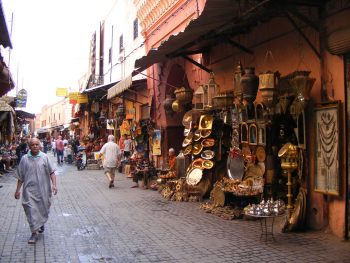The great extent of diversity in Arabic Posted by Hanan Ben Nafa on Apr 19, 2017 in Grammar, Pronunciation, Vocabulary

Every Arabic learner probably had to face the fact that Arabic is not a single language and there is a high variety: Standard Arabic, and a low variety: regional dialects, more than 20 of them. Today, we are using a short video that illustrates, very well, the great extent of this diversity. It shows the difference between Standard Arabic and four regional dialects (Egyptian, Levantine, Gulf & Maghribi).
In this blog, we are only going to focus on the first four dialects. We’re particularly focusing on the most obvious differences: pronunciation, syntax and lexical items (verbs and question words, in this case).
https://www.youtube.com/watch?v=KA4PYlt1zaM&feature=youtu.be
What is repeated in different dialects here is a question and its answer (Minutes: 2.85 – 3.30):
Q: What do you want? A: I want coffee
1- Standard: Q: مَاذَا تُرِيدُ؟ A: أُرِيدُ قَهْوَه
Matha Tureed? Ureedu Qahwa
2- Egyptian: Q: عَايِزْ إِيهْ؟ A: عَايِزْ قَهْوَه
ʕayez eeh? ʕayez Ahwa
‘You want what?‘
3- Levantine: Q: شُو بَدَّكْ؟ A: بِدِّي قَهْوَه
Shou biddak? Beddi Ahwe
4- Gulf: Q: تِبْغَى إِيشْ؟ A: أَبْغِي قَهْوَه
Tebgha eesh? Abgha Gahwa
‘You want what?‘
You can see that a phrase as simple as ‘What do you want’ or ‘I want coffee’ can vary from one dialect to another. The differences we have here are three: 1-Lexical (Question word: ‘what’ and ‘you want’, 2- Syntactic (word order of the interrogative sentence components), and 3- Phonetic (the pronunciation of the ‘coffee’).
1- Lexical: ‘What’: Apart from ‘Maatha’ which is standard and not actually used in everyday situations, the other question words :’eeh’, ‘shou’ and ‘eesh‘ are all relatively similar. If one is familiar with one, they can guess the other from the context.
– ‘You want’: The lexical items for ‘want’ are completely different.
2- Word order: Word order tend to be flexible in regional dialects. One can start their question using the actual question word: ‘Matha’ or ‘Shou’, but can also start with the verb (ʕayez). However, in Levantine. e.g. one can only start with the Q word and not with verb, so ‘shou baddak’ and not ‘baddak shou’.
3- Pronunciation: The first sound of ‘qahwa’ varies from /q/ in standard Arabic to /a/ in Egyptian & Levantine to /g/ in the Gulf and Maghribi . The final sound also can be /e/ or /a/.
It’s not that bad….
Although Arabic is very diverse and this is probably one of the biggest challenges Arabic learners face, it is not really that bad. Not everything is as diverse as this, but this is just an example of how diverse Arabic can be. It is true that not all dialects are mutually intelligible, but most Arabs can have a smooth conversation together by adjusting to each other’s’ dialect or speak in neutral one and avoiding using dialect-specific words. For example, Egyptians usually call a table طَرَبِيزَه’ tarabeeza’, which is طَاوِلَه ‘taaw(e)la’ in most Arabic dialects. However, if one only knows ‘taawla’, Egyptians would still be able to communicate with them because ‘taawla’ is also standard.

Build vocabulary, practice pronunciation, and more with Transparent Language Online. Available anytime, anywhere, on any device.



